Peter MALONE
Saturday, 18 September 2021 19:23
They Call Me Bruce
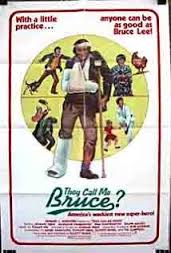
THEY CALL ME BRUCE
US, 1982, 86 minutes, Colour.
Johnny Yune.
Directed by Elliot Hong.
They Call Me Bruce is American matinee material - quite pleasant and inoffensive in its way. It stars Korean-American? comedian Johnny Yune under the direction of Korean-born director Elliott Hong.
The film shows Bruce as an ordinary young man in the employ of the Mafia - who mistakenly saves a man from being robbed and is considered to be a Bruce Lee look-alike. There are many visual tributes to Bruce Lee, his martial arts films and his influence (and some jokes about Americans and Orientals). The screenplay borrows from routine American plots and ranges in its characters and spoof situations from the Californian way of life to the Mafia, westerns and the open road to New York and a religious revival for blacks. There are constant allusions to films especially by music: The Godfather, Saturday Night Fever, Urban Cowboy, Fame. The film is, eventually, another routine variation on the little man who becomes hero. The supporting cast includes attractive martial arts actress Pam Huntington and in her first role since Lipstick, model Margaux Hemingway - who is photographed as unflatteringly hefty.
A moderately entertaining (for the widest of audiences) example of '80s American popular films.
Published in Movie Reviews
Published in
Movie Reviews
Tagged under
Saturday, 18 September 2021 19:23
These Three
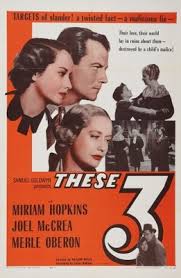
THESE THREE
US, 1936, 93 Minutes, Black and White.
Merle Oberon, Miriam Hopkins, Joel Mc Crea, Bonita Granville.
Directed by William Wyler.
These Three is a well made Samuel Goldwyn production of a play by Lilian Hellmann called 'The Children's Hour'. It had a lesbian theme but this was changed in the film version to an ordinary heterosexual situation. Lillian Helman herself did the adaptation. The film is well directed by William Wyler who directed adaptations of Lillian Hellmann’s work as Dead End and The Little Foxes. Wyler was a most prestigious director in the 30s and this reputation continued until 1970. He won Oscars for such films as Mrs. Miniver, The Best Years of our Lives, Ben Hur.
He remade this film reverting to the original lesbian theme and including a tragic suicide in The Children's Hour in 1961. Merle Oberon and Audrey Hepburn played the part of Karen and there is a remarkable visual similarity between the two. Miriam. Hopkins who was to be Aunt Lily in the later version was Martha. Shirley Mac Laine played this part in the later version. The respective heroes were Joel McCrea? and James Garner. This original version although "watered down" for the audiences of the 30s is still nevertheless a telling story and insightful for human relationships. In each film the portrayal of the girl Mary, who is the cause of all the trouble, is very well done. Bonita Granville is excellent in this version as Mary.
1. A satisfying emotional and social drama? Interest, entertainment?
2. Film-making in the 30s, Hollywood presentation? The appeal to contemporary audiences? The status of a classic? Personal issues, presentation of society, the response of people to social situations, rural situations, potential scandals? Questions of justice? The focus of the title on the three friends? The original play was called 'The Children's Hour'. The significance of this? The re-make was titled for some countries as 'The Loudest Whisper'. An appropriate title? Lillian Hellmann and the strength of her writing in the 30s? The play had a lesbian theme as did the re-make. There was also suicide at the end.
3. Comment on the adaptation of this screenplay from the original - towards conventional heterosexual and potential adultress situation. The elimination of the sadness of the pressure to suicide. How satisfying a screenplay in itself? As an adaptation from much more serious and controversial material?
4. How well did the film introduce us to Karen and Martha? The graduation, their joy, prospects for their future, the searching out of Karen's house, the ambitions of setting up the school? The introduction of Aunt Lily in this context? How well did we get to know the three women as they began their work? Their differing personalities, likeable, unlikeable?
5. The discovery of ice at work, his presence in the house and his help, the growing bonds between them? As the hero of the film? His love for Karen, his unwitting ignoring of Martha and going to sleep when she was talking? The hurt to Martha and his not realizing it? The importance of the outing with Karen and its joy, the merry-go-round, the proposal? Ordinary romantic conventions, but with the strength of the characterizations?
6. The differences between Karen and Martha? Karen and her greater ease with children, the running of the school? Martha and her tension? Her work? The importance of the night talking to ice and his remaining there for the long hours? Aunt Lily's reaction? How well was the film building up tension at this stage?
7. The opening of the school, the help of Mrs. Tilford, the girls? The school sequences and the teaching of Latin? The focus on Mary? Mary's presence in the school, her relationship with the girls, the gradual revelation of her self-will and her being overbearing? The irony of Mrs. Tilford helping to build the school and destroy it? The film's comment on wealthy people, society, capriciousness, evidence, harshness?
8. How well did the film present Mary and her control over Rosalie and the others? Her viciousness, moods, strength, bringing the flowers to Aunt Lily and being exposed, Karen's punishing her and her reactions? The way that she bullied Rosalie about the bracelet? Her manoeuvring of her grandmother and telling her the story, the whispering? The overbearing attitude towards Rosalie and making her take an oath? Her tantrums? How could she persuade her grandmother that what she said was the truth? The importance of the repercussions of this in the court and the sympathy of the court and the people for the children?
9. The repercussions of Mary's action on Karen, Martha and Joe? The clash with Aunt Lily and its background for Mary's evidence? Aunt Lily's leaving and her cowardice in not reappearing to help even though the defence rested very much on her? The impact of all the children leaving and the lack of explanation, the chauffeur telling them the story? The importance dramatically of the visit to Mrs. Tilford, their plea for their lives, the telling of the truth and her haughty reaction? The summoning of Mary and her tantrum and menacing of Rosalie and the inability of the adults to do anything? The transition to the court, the libel suit, the cheering of the crowd when the verdict was given?
10. How credible was it that Karen would doubt whether Joe was telling the truth - her reaction to this and letting him go? Her communication of this doubt to Martha and Martha's pain?
11. Aunt Lily's return and her acting as if she was in oblivion of what went on, her incessant chatter, being provocative? Martha's sending her away and then her decision to go with her? The build-up to the chatter on the train and the revelation about Rosalie and the bracelet?
12. Martha's strength in confronting Rosalie and yet her tenderness in treating her as a child? The confrontation with Mary and Rosalie's having the strength to tell the truth? Mary's tantrum? The irony of the maid and her constant criticism of Mary and her vindictiveness when Mary was found out? The importance of Mrs. Tilford's conscience and Martha not wanting to ease it too readily?
14. Mrs. Tilford's mission to Karen and part of her reparation for what she had done?
15. The light touch of the happy ending in Vienna - appropriate for this kind of film or too easy for the intense issues that it had treated?
16. A valuable film for understanding persons, emotions, relationships? moral issues, privacy, suspicions, lies, judgments? The reaction of people with lack of evidence? How interesting and entertaining?
Published in Movie Reviews
Published in
Movie Reviews
Tagged under
Saturday, 18 September 2021 19:23
There's No Business Like Show Business
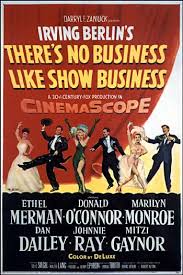
THERE'S NO BUSINESS LIKE SHOW BUSINESS
US, 1954, 117 minutes, Colour.
Ethel Merman, Donald O'Connor, Marilyn Monroe, Dan Dailey, Mitzi Gaynor, Johnny Ray, Hugh O'Brian.
Directed by Walter Lang.
There's No Business Like Show Business is an Irving Berlin musical with several popular songs, some of the big stars of the 50's and given the early Cinemascope treatment. It is typical showbiz material, except that the family is Catholic and has a son a priest in the form of singer Johnny Ray. Style is gaudy and loud, but enjoyable for those who like the musicals of the 50's.
1. Was this a good American musical, typical of the 50's musical? Was it an enjoyable musical?
2. It is considered a big, brash musical. Do you agree? How entertaining are musicals of this kind?
3. It presented a U.S. 'showbiz' family. Did it live up to the image of American show business, or was it acceptable as realistic? What do musicals like this show about Americans? About their belief in themselves? Were the characters real, conventional, or cliche characters?
4. The parents - as 'showbiz' entertainers, strong mother, subdued father, seeking out lost children, etc.? The children - Katie as fairly normal, Tim as being rebellious and leaving, Steve as being good and becoming a priest? Were the characters interesting?
5. Was this an interesting picture of the back-stage life of a popular family of entertainers? Why is this kind of story always popular with audiences - the reality behind the facade of glamour etc., curiosity?
6. Was there any insight into human values in the presentation of the family and its various struggles and attempts to find love for one another?
7. The character of Vickie - was this too strongly drawn for Marilyn Monroe as herself? Or did she fit into the narrative of the film?
8. The contribution of the songs - popular Irving Berlin songs, the style and personalities of each of the actors and actresses? The style of the songs and their choreography?
9. Why are such films worthwhile reflecting on?
Published in Movie Reviews
Published in
Movie Reviews
Tagged under
Saturday, 18 September 2021 19:23
Theatre of Blood
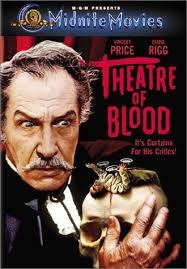
THEATRE OF BLOOD
UK, 1973, 103 minutes, Colour.
Vincent Price, Diana Rigg, Ian Hendry, Harry Andrews, Carol Browne, Robert Coote, Jack Hawkins, Michael Hordern, Arthur Lowe, Robert Morley, Dennis Price, Milo O'Shea, Eric Sykes, Diana Dors, Joan Hickson, Renee Asherson.
Directed by Douglas Hickox.
Theatre of Blood is a classic of horror - not just because it is very well-made, designed and acted and extremely enjoyable horror, but because its theme is acting, Shakespeare and Shakespearean revenge. That is, the offended actor, Edward Lionheart, murders eight insulting critics in very clever parodies of death scenes in Shakespeare's plays. Full of in-jokes, witty and outrageous puns and lines, it should entertain horror fans and delight those familiar with the Bard. Vincent Price shows the benefit of all his horror films in the central role and is aided by stage and Shakespearean
actress, Dianna Rigg. Prominent English comedians are great victims or police. A horror treat.
1. Was this a successful horror film? Why?
2. How did the Shakespearean settings, parodies and flavour add to the film?
3. Was Edward Lionheart a credible character? was his story and his being saved from death credible? What was wrong with him - in his acting, in his denouncing the critics, in his would-be suicide, in his "punishing" the critics in a macabre way? He likened himself to King Lear. Does the parallel throw any light on his behaviour?
4. He was helped by his daughter - does the Cordelia role of her death and devotion give insight into her behaviour? (She is more like Goneril or Regan in aiding the murders.)
5. How humorously macabre were the murders? In good taste? Too gory or horrible for film entertainment?
6. Did the styles of murder and their insight into the defects of the critics as persons have lessons? - were the punishments merited, not merely because of criticism of Lionheart, but because of personal 'sins' - evicting the meths arrogantly, hypocritical praising and condemning, jealousy, drunkenness, womanising, vanity and greediness?
7. Why was the President of the Critics spared?
8. Was the ending partly tragic or totally melodramatic?
9. What is the value of a film like this?
Published in Movie Reviews
Published in
Movie Reviews
Tagged under
Saturday, 18 September 2021 19:23
That Was Then, This Is Now
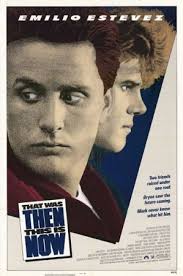
THAT WAS THEN, THIS IS NOW
US, 1985, 97 minutes, Colour.
Emilio Estevez, Craig Sheffer, Kim Delaney, Jill Schoelen, Barbara Babcock, Morgan Freeman.
Directed by Christopher Cain.
That Was Then, This Is Now is the fourth film version of novels by S. E. Hinton. Francis Ford Coppola made two in quite an idiosyncratic way (with the help of Hinton): The Outsiders, Rumble fish. The film version of Tex was much more straightforward. Matt Dillon was the star of all three films.
Emilio Estevez, son of Martin Sheen, appeared in The Outsiders (as also in In The Custody Of Strangers, Repo Man, Nightmares, Breakfast Club, St. Elmo's Fire). Estevez wrote the screenplay and stars. He gives an intense performance which is well matched by The film is set in Minnesota, uses the atmosphere of Minneapolis- St. Paul for its urban story of teenagers, friendships, betrayal and growing up. These are typical S. E. Hinton themes - presented more straightforwardly than in the other films, but quite persuasively.
1. The youth film of the '80s? The comedies? Exploitation? This film as a more serious look at adolescence? For an American audience? Overseas?
2. The popularity of the writings of S. E. Hinton? Her sympathy with youth, her understanding of the problems, the outsiders, relationships, change, violence, hurt? A feminine viewpoint on male adolescence?
3. Emilio Estevez and his contribution to the film, writing, acting?
4. The atmosphere of the city. Minneapolis? Authentic atmosphere, the streets, school, homes? The musical score? The theme?
5. The title and its explanation, use by Bryon? Change, coping?
6. Friendship, growth, change? The styles of the two boys, the leader and led, age. experience, youth, tough attitudes, fights, games? The light and the serious? The two boys and the driving, sharing, hanging out together? The threats to their friendship? Upset? Intruders, reactions? Loneliness, violence? The need to break out? A variation on the American buddies theme? Needs, love, hurt?
7. The background for the two boys: the home. the sharing? Mrs. Douglas and her husband? A home.. her ease with Bryon? Taking Mark into the home? The muddle and the revelation about his parents, shooting, illegitimate, nine? The scenes at the bowling, the hospital, home and school?
8. Mark and the introduction to his personality: speeding, the car ride, dare, school, fights, dances? Terry? M and M? The fights. Mark with M and M? Kathy and her reaction, dancing, the bottle? Mark feeling more and more betrayed? The visit to Charlie, the nature of the rules, the pool? Hustling - leading to the shooting and Charlie's death? His response to Mrs. Douglas? Home? M and M and his singularity, the hideout? Being involved with the drugs? His anger and hurt at finding Bryon in bed with Katherine? The despising of Angela. cutting her hair? Bryon being bashed? Mark changing, Bryon kicking him out? The fight. the car, the police, prison? The sad story of his life? The confrontation with Bryon in prison? His future? Type, energy. spirit? The meaning of the adolescent outsider?
9. The contrast with Bryon: friendship with mark, sharing home, more balanced, the car, the bus? The friendship, tough encounters, the fights with the gang? Wanting Mark to lighten up? His friendship with M and M? His love for Kathy, visiting her home? The past friendship with Angela and the breaking of it? The gang? His mother in hospital? Bryon as polite, the influence on Mark? Mark's help about the shirt? The visits to Charlie, playing pool, the clash with the gamblers? The impact of Charlie's death? Deborah? And her grief? Kathy, the dance, fights? Angela and the cutting of the hair, bashed? The dates? Searching for M and M, finding him, his anger with Mark, ousting him? His mother's influence? Trying to soften him? The visit to prison, the talk, the final drive - like Mark driving? Lightening up?
10. Kathy as pleasant and attractive, at work in the supermarket, family, Bryon's visit? The clashes with Mark? The dance? Experiencing Mark's jealousy? M and M and his strangeness? Love for Bryon, the sexual encounter, the break between the two? The reconciliation? The comparison with Angela, old girlfriend, the break, going out with the boys, drinking, her hair, anger? The encounter at the supermarket? The contrast of the two girls?
11. Mrs. Douglas as a good woman, open-minded, hospitable to Mark, in the hospital, understanding, supporting each of the boys?
12. M & M and his place in his family, the attacks by his father? Vague, writing poetry, bashed? With mark, running away, the drugs. found, hospital? Bryon and his response to the family? The sketch of the parents?
13. The gangs. their toughness, poses, fights, bashings?
14. Charlie and the bar, a good man, wise, interest in mark and Bryon. helping them, angry with them? The pool game, his supporting them? The pathos of his death? Deborah and her love, grief?
15. The pool-players and the hustle game, their reaction to being hustled, the violence, the court case and the boys being involved?
16. The background of contemporary youth: school. clashes? Cars, hanging out? Fights? Relationships, change, taking responsibilities, growing away from each other?
17. An interesting and involving exploration of contemporary youth themes?
Published in Movie Reviews
Published in
Movie Reviews
Tagged under
Saturday, 18 September 2021 19:23
That Wonderful Urge
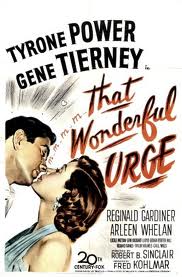
THAT WONDERFUL URGE
US, 1948, 82 minutes, Black and white.
Gene Tierney, Tyrone Power, Reginald Gardiner, Arleen Whelan, Lucile Watson, Gene Lockhart, Porter Hall.
Directed by Robert B. Sinclair.
That Wonderful Urge is a pleasant inconsequential romantic comedy. It is in the vein of the comedies of the '30s - though a bit more seriously taken in the mid-'40s. Tyrone Power and Gene Tierney were more at home in dramas and action adventures but do their best in this romantic farce and mistaken situation comedy. It illustrates the perennial appeal of this kind of material.
1. An entertaining comedy? Its place in the tradition of screwball comedies of the ' 30s and later romantic comedies? Its appeal today, dated?
2. The conventions of the genre - the establishing of the hero and mysterious identity, the heroine and her wealth, her suitors? The confrontations, the farcical situations - e.g. prison, the battle of the sexes, romance and marriage? The settling of differences for a happy ending? How well were these conventions? How particularly American?
3. Black and white photography, the world of affluence, newspapers, courts, prisons? The musical score?
4. How plausible the plots of the screwball comedies? Sufficient for the purposes of the battle of the sexes and for romance? Audience accepting the contrivances of the plot?
5. Tyrone Power as romantic comedy hero? His being introduced as Tommy Thomas, the revelation that he was the author of the articles attacking Sarah Farley? His interviewing her and her attraction towards him? His making mistakes in withdrawing his article, the clash with Sarah, her contriving the engagement to him, the lengths that he went to to get out of the engagement, his relationship with his editor, with his girlfriend? His decision to take the challenge seriously -the taking of the food from the supermarket etc.? Establishing himself in the house? The way that this was used in evidence against him? His trying to get out of the marriage, chasing Sarah, his behaviour at the party, their time in prison? The gradual attraction towards each other? The decisions about the separations and the divorce - the telling of the truth? The happy ending? An American romantic hero?
6. Gene Tierney's style as romantic heroine? Her wealth, isolation from people, her suitors especially Andre and his attentions? Her attractions towards Tommy? Her telling her story in the cabin? The decision to pretend that there was a marriage, her taking advantage of the situation, her not being able to handle his manoeuvres, especially his presence in the house? Her disclaimers, her winning the rounds in the prison cell? Her continued attacks, the divorce proceedings, her hostility, her love? The battle of the sexes?
7. The contribution of the minor characters - Andre and his continued attentions, the newspaper editor? Tom's girlfriend?
8. The stock situations and their enjoyment even despite their predictability: the initial interview, their being snowbound and discussing Sarah's life, the farcical aspects of proving the marriage and disproving it, the prison night and the attitude of the judge, the law court sequences etc.?
9. The perennial themes of the battle of the sexes, true love and romance, wealth, reputation, the telling of the truth?
Published in Movie Reviews
Published in
Movie Reviews
Tagged under
Saturday, 18 September 2021 19:23
That's My Boy

THAT'S MY BOY
US, 1951, 98 minutes, Black and white.
Dean Martin, Jerry Lewis, Eddie Mayehoff, Ruth Hussey, Polly Bergen, John Mc Intire.
Directed by Hal Walker.
That's My Boy is one of the earliest of the Martin and Lewis comedies. After their nightclub act and their cinema debut in My Friend Irma, they made a great number of films in the early '50s before going on their separate ways and successful careers. This film is somewhat more serious in theme that many of their others - with the exception of The Stooge. The blend of serious themes about growing up, high expectation fathers blends with Jerry Lewis' comedy routines and Dean Martin's songs. The film also introduced Eddie Mayehoff, who appeared in only a few films with characteristic comedy style. The film is interesting as a different approach to Martin and Lewis comedies.
1. The popularity of Dean Martin and Jerry Lewis in the '50s? Nightclub routines - fall guy, slapstick and farce, verbal humour, suave songs? An entertainment blend? Their transfer to the screen? This film as typical or not?
2. Jerry Lewis in a more serious style role? Avoiding his mugging style? Development of character? Point to his character? He even wins! Reality, dreams? Romance?
3. Dean Martin and his smooth style, his early songs, hero in helping Jerry Lewis?
4. The opening and the focus on Jarring Jackson: shower, the exercises, breakfast, his den, ambitions for Junior, memories of his college and college days, money, the discussion about psychosomatic illness? The pressures on Junior and the discussions with him? The patience of his wife? The build-up to graduation and his envy of Bill Baker? The deal with him and the coach? The matches and his presence and humiliation? The psychiatrist and the discussion about hunting and Junior going hunting with him? The final game and his leaving Junior alone? The final walk together and discussion? The point being made through comedy about fathers, career, expectations, making their sons like them, sons' reactions, psychosomatic illness?
5. Junior's pleasant mother - care for her son? Eventually trying to control him as his father did?
6. Junior and the caricature of the pampered young man? His relationship with his father and fear of him, pills, dancing, Babs and wanting to drive her home, going to college and rooming with Bill and their mishaps e.g. the closing of the window etc.? Falling in love with Terri? The failure of the matches? The coaching? The training and his insight? Waiting for the games and final success? The points made in the character of Junior? Jerry Lewis' style subordinated to the character?
7. Bill as hero, his vanity, the dance, looking down on Junior, going to the college? The deal with Jarring Jackson? The rooming? Courting Terri? Pleasant? Drunk sequence? Standing back for Junior?
8. Terri as attractive heroine? Her concern about the truth? Helping Junior? Working with Bill for his training? Happy ending?
9. Babs and her glamour, her behaviour at the dance, the drive home? The final puckering of her lips - and being put down by Junior?
10. Background themes of American football, college scholarships, coaches, pressures? American heroes, American dreams?
11. The psychologist and his explanation of psychosomatic illness? Pressures from parents? Discussion about the hunting - and the hunting trip?
12. Themes of growth, freedom? Serious undertones to a Martin and Lewis comedy?
Published in Movie Reviews
Published in
Movie Reviews
Tagged under
Saturday, 18 September 2021 19:23
That's Dancing

THAT'S DANCING
US, 1985, 100 minutes, Colour.
MGM stars.
Directed by Jack Haley Jr.
That's Dancing is a compilation memoir of dance on film. it is a delightful and exhilarating experience. It follows the two anthologies from M.G.M. films - That's Entertainment and That's Entertainment II. The popularity of compilation films grew with similar work being done on westerns and horror films (Terror on the Aisle). Gene Kelly is Executive Producer and acts as one of the hosts of the film. The film was written and directed by Jack Haley Jr., who did the original That's Entertainment. His credit goes over the image of his father, Jack Haley as the Tin Man in The Wizard of Oz. Haley was married for a brief time to Liza Minnelli, who also makes an appearance as host in this film. Other hosts are Mikhail Baryshnikov, Ray Bolger, Sammy Davis Jr.
The excerpts are entertaining - highlights are Ernst Lubitsch's silent presentation of music, the work of Busby Berkeley, Fred Astaire and Gene Kelly, the talented individuals and teams of the '30s. the M.G.M. musicals and the Broadway musicals brought to the screen.
1. Hollywood and its heritage, dance and cinema, a delightful and exhilarating experience?
2. The polish and style of the film: Henry Mancini's opening song and the visual delight of the collage? Kim Carnes singing the final song? The hosts and their style and comments?
3. The collages, the selections from the various films - both visual and sound? Editing and pace?
4. The history of dancing done to the opening songs and rhythms? The silent films and their awkwardness, the peak with the work of Ernst Lubitsch?
5. The film's homage to Busby Berkeley and his ingenuity - seeing him in the trailer, the explanation of his innovative work, the generous selections from his films?
6. The transition to Fred Astaire and graceful movement and camera work? The contribution of Astaire to the development of the cinema musical?
7. Sammy Davis Jr. and his own work, his explanation of the individuals and teams of the '30s and '40s? The contribution of black dancers?
8. M.G.M. and its lavish productions - personalities, singing, dancing, comedy?
9. The explanations of the limits of ballet on screen, the developments of Vera Zorina and George Balanchine, Moira Shearer and The Red Shoes? Nureyev? Baryshnikov himself?
10. The selection of excerpts from Broadway musicals and the cinematic treatment of dance excerpts?
11. The '80s and the exhilaration of disco and Saturday Night Fever, the spontaneity of Fame, the figure of Flashdance - and video clips and their style with Michael Jackson?
12. The common elements of dancing over the decades? The development of camera techniques and editing for dance? Film as the preservation of dance art?
Published in Movie Reviews
Published in
Movie Reviews
Tagged under
Saturday, 18 September 2021 19:23
That Kind of Woman
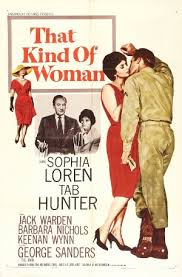
THAT KIND OF WOMAN
US, 1958, 92 Minutes, Black and White.
Sophia Loren, Tab Hunter, George Sanders, Jack Warden, Barbara Nichols, Keenan Wynn.
Directed by Sidney Lumet.
That Kind of Woman is an amiably ironic comedy. In itself it is not of great value although it has a pleasant performance by Sophia Loren and ironic one by George Sanders. Tab Hunter, though pleasant, is no match for the other leading stars. What makes the film of particular interest is that it is one of the earliest films directed by Sidney Lumet. At this stage he was at the beginning of a successful career - he had made Twelve Angry Men, Stagestruck, and The Fugitive Kind. During the 60s he had achieved some popularity with versions of Long Day's Journey into Night and A View from the Bridge. He also made The Pawnbroker, The Hill, The Group. His films were not so popular by 1970 but in the mid 70s he made a successful critical and commercial comeback with Serpico, Dog Day
Afternoon, Network, Murder on the Orient Express and Equus.
1. The meaning and tone of the title? Indication of sharp drama or romantic drama? Which kind was the film?
2. The quality of the black and white photography, the documentary atmosphere of the train and New York etc., the use of sounds often rather than music? Other technical achievement?
3. The atmosphere of war, how well was it communicated visually and by theme? The atmosphere of the train and the train ride and its effect on people? The picturing of cities, life of cities, the effect of cities on people. The restaurants, the streets? The meanings of lives in such atmospheres?
4. How sharp and observant was the screenplay and its treatment? How much insight into war themes and into real persons? How much was romantic and conventional?
5. The importance of war and its theme. The impact of war in America and on peoples' lives? Accidental meetings and interactions? Poverty and riches, opportunities and opportunism? Soldiers and the background of war and death, leave and the need for people? Time and the shortness of time? The quality of love and people driven to love? Protection by big business, the role of wealth in war? Jane for instance wanting the war to go on so that the life would not change? What judgement was made on the war-theme?
6. How satisfactory a hero was Red? His boyish expressions? Being considered a boy, protected by Kelly, by Kay? His love and infatuation? His immaturity in approach and feelings? His reaction in the train? Following Kay to the house, creating the scene in the restaurant? Did he understand himself well, understand Kay? Why did he want to be loved? The difficulty of Kay's telling him the truth? His pressing her, waiting for her? What future would he have (the paratroopers and D-day and the background of the film?) His ideas of a future life married with Kay in Vermont? How much insight into an ordinary character did this portrayal give?
7. How attractive was Kay? Sophia Loren's performance and style? The Naples background, the war and poverty, the need for protection, enjoying wealth, her reliance on The Man? Her capacity for having a good time and laughing? The morality of her situation? Any regrets? Red's attack that she was not a hot-shot? Her comments on being known by him and the allusion to the flavour of ice-cream? On the train, the effect of Red on her, talking, resisting, and a choice between a career and wealth and reality and love? How convincing was this? The discussions with Jane, Kelly, the man? The enjoyment of the day with Red? On what basis did she make her decision?
8. Was the man a convincing character? Politics.. graft, amorality, love and protection? The typical wheeler-dealer behind war and big business? The final sequence and his letting Kay go?
9. How enjoyable was the parallel of Kelly and Jane with Red and Kay? Kelly as a show-off, a con-man, having a good time, laughs, The change in emotions? Jane as similar in her role of having a good time? How was each of them hurt? Why did they not stay together?
10. How important was the sketch of Harry and his particular type, protection, working for the man, his role with the girls etc.?
11. How valuable were the scenes of interaction, the quality of the dialogue, the situations real or contrived?
12. How did the film balance emotional tension and romantic overtones?
13. How much insight into love, hate, decisions?
Published in Movie Reviews
Published in
Movie Reviews
Tagged under
Saturday, 18 September 2021 19:23
That Forsyte Woman/ The Forsyte Saga
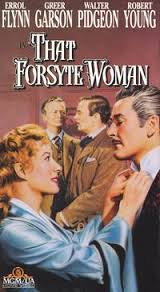
THAT FORSYTE WOMAN (THE FORSYTE SAGA)
US, 1949, 114 minutes, Colour.
Greer Garson, Errol Flynn, Robert Young, Janet Leigh, Walter Pidgeon, Harry Davenport, Aubrey Mather.
Directed by Compton Bennett.
That Forsyte Woman was one of M.G.M's elegant productions for its Silver Jubilee. It cast popular twosome Greer Garson and Walter Pidgeon in central roles - although Walter Pidgeon, in portraying the artist Jolyon Forsyte, was playing very much against type. Also playing against type was the other star, Errol Flynn. He does a very creditable job as the stiff snobbish Soames. It is in marked contrast with his adventurous roles at Warner Bros. There is a very good supporting cast - although Robert Young seems somewhat bland as Philip Bosinney (although the character is of this nature). The film also offered an early role for Janet Leigh.
There are excellent sets and decor, re-creating the late 19th. century English atmosphere. The supporting cast - in appearance and manner - also makes social critique and comment on the newly-rich families in late Victorian England. There is a melodramatic score by Bronislau Kaper and the film was directed by English director Compton Burnett who had made a success of The Seventh Veil and was to make King Solomon's mines before returning to England and much more routine films. In the '60s there was a famous television series made by the B.B.C. starring Eric Porter as Soames and Nyree Dawn Porter as Irene. This film is based on the first volume of John Galsworthy's Forsyte Saga.
1. The popularity of John Galsworthy's novels, period. situations, characters? Social and humane themes? A film adaptation of the novel?
2. Production values: M.G.M. elegance and gloss, Hollywood version of England, the re-creation of period in sets, costumes and decor? The atmosphere of England in the 1880s? Colour photography? Melodramatic score? The cast and people playing against typecasting?
3. The adaptation of Galsworthy's first volume? The focus on Irene? The title and the expectations on Irene? The film as a Greer Garson vehicle?
4. Irene as a focus of sympathy, meaning, the critique of the Forsytes? A strong woman in Victorian England? The outsider and the established family? The family and the Forsyte men in comparison with Irene?
5. The flashback structure: the focus on the gaslight, the fog? Irene wandering. Soames and Jolyon pursuing her. Philippe's being in hospital. June's anger? The flashbacks and the ironies of the audience sympathising with what they saw and wondering about what had happened? The significance of the narrative by Jolyon - his description of events. personal involvement, personal exclusion. directing audience response to Irene? The finale and its relationship to Irene and Jolyon and their marriage? The effect of audience involvement in the plot, understanding of the characters, sympathies?
6. The initial impact of Irene - and seeing her through June's eyes? Through Jolyon's eyes? The courting by Soames and his defence of her to the family, the family's snobbery towards her, his continued proposals, her refusal and the motives? The story of her background and her father as a professor? The scene with the landlady arranging Soames' visit? The motives for Irene's succumbing to Soames' proposals? The description of their life over two years and the theatre sequence? Soames' explanation of the basis of the marriage - regard and fidelity? Irene's inability to love Soames? His showering her with gifts, clothes, the building of the country house? The tension of the anniversary sequence and his assuming Irene had forgotten? Her being hurt? June's visits and the friendship between the two women - with the irony of what was to happen? The Forsytes gradually accepting Irene? old Jolyon offering his friendship? The aunts and their observations and comments - and Irene's putting them down as regards Philippe? Soames' father and his observation of Soames' marriage and wanting to possess Irene? The encounter with Philippe, his charm and Irene's response? The encounter with June and Philippe in the park? The planning of the house? The visit to the countryside? Philippe's declaring his love for her and the confusion for Irene? Her begging Soames to go away? Her not wanting to see Philippe again? June's engagement and her presence, the dances, the discussion with Philippe? Her decision to go to his flat and her being seen by June? Her leaving Soames, going to Philippe? The impact of the accident? Her wanting to act honourably towards Soames, towards Jolyon, towards June? The irony of the parallels between the Forsytes' treatment of Irene and that of Philippe? The passing of time after the divorce from Soames? Her portrait in Paris? Soames wanting it? Her dread of seeing him? The happy marriage to Jolyon? The portrait of a strong Victorian heroine - a woman of honour, passion, freedom?
7. Soames and Errol Flynn's interpretation? The initial impact? The flashback and his dry manner, humourlessness. pursuit of Irene, attitude to wards property and possessions. the proposal without the basis of love, his expectations of his wife, his legal attitudes, punctuality, disappointment as regards the anniversary? The irony of his having destroyed Jolyon's picture for Irene? His wanting to please her with the house and the irony of throwing her together with Philippe? His insensitivity as regards the holiday? His wanting her to go to June's engagement party? Receiving the note from June and his reaction? The confrontation and his reaction to her leaving him? The confrontation with Philippe and witnessing his death? The divorce after hiring the private detective? His mean attitude? His watching the portrait of Irene in Paris? His demanding it and her sending it? His disappointment? The 19th. century new rich family. working origins. snobbery? And yet Soames' capacity to answer his family but his succumbing to snobbery?
8. The portrait of the family - especially in the tableaux at the parties and receptions? old Jolyon and his birthday. the portrait. his love for June? Disregard for Irene? Growing to like her? His harsh attitudes towards Philippe? The uncles and their eye to business, emphasis on money? Their not wanting to mention their origins? The aunts and their gossip? The hurt to Hester and her being a spinster? The younger generation and their seeming to be ineffectual? Their origins, comparisons with the aristocracy, emphasis on money, family pressures, the Forsyte clan and their seeing their family history as a saga? The reasons for excluding Jolyon and scandal and standards? The irony of his long voice-over on the Forsytes and their wealth and snobbery? The film's attention to detail about the family?
9. Jolyon and Walter Pidgeon's interpretation, the explanation of his exclusion from the family and his not seeing June, the gallery encounter with Irene and sending the painting, the clash with Soames? His being excluded from celebrations? His encounter with Irene with the book about architecture? His meeting her at the engagement party? Irene's urging June to see her father? June's turning to him in difficulty? The encounter with Irene and Philippe's death? His standing by Irene instead of June? Marriage, his success? The freer spirit of the 19th century reacting against staid Victorian ambition and snobbery?
10. June as an attractive yet spoilt girl. her friendship with Irene, infatuation with Philippe. promoting Philippe's career, the engagement party and her sensing something was wrong. her talking about suicide. her exhilaration about Philippe e.g. at the visiting of the country estate? Her seeing Irene at the apartment,, sending the notes, her bitterness? The mention of her having got over it and her marriage five years later?
11. Philippe and his carefree attitude. charm, giving the money to the children after telling the story. verbal sparring with Irene, the outings, the infatuation with Irene, the plans of the house, his visits to discuss the rooms and his proposal to her, kissing her, his refusing to be rejected? The disregard of the future? Not wanting to hurt June but wanting Irene? The engagement party? The visit of Irene and June's seeing him with the flowers? The confrontation with Soames? The irony of the accident and his death?
12. The minor characters and their contribution: Irene's landlady and Soames' visit, the shop assistant discussing Irene's beauty, the young cousin at the party getting Irene's prograrme, Soames' butler, the private detective?
13. The attention to detail of manners, good form? The contrast of good manners with moral attitudes?
14. The emphasis on property, and the social comment and critique of Galsworthy of such families as the Forsytes?
15. Themes of marriage - as an institution, the basis of contract and love, divorce and scandal?
16. Themes of business, law contrasting with art and creativity?
17. A successful adaptation of a novel to two hours running time - and urging viewers to go back to the novels?
Published in Movie Reviews
Published in
Movie Reviews
Tagged under